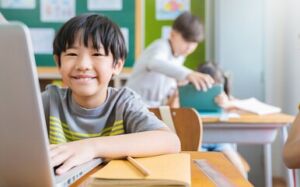Impact of online class on kids
1. Lack of physical activities:
Obesity in children is on the rise either due to lack of outdoor physical activities or due to binge eating and easy availability of junk food at home. Children are losing their muscle mass and adding fat which is going to affect their growth. Research has shown that the more physically active a child is during the growing period the better is their physical and mental health for the next 3-4 decades of life. Physical activities play a large role in the Calcium and Vitamin D levels of the body. Deficiencies are on the rise in recent times in children and their reasons are very obvious Online learning affects everyone from young children to young adults, teachers, and professors. For many students, virtual classes may worsen existing mental health disorders. For others, the impact of the pandemic and online learning can trigger new changes in mental health and mood. Below are some of the ways teens are most affected by online learning.
2. Social Isolation
While primarily a place of education, school is also the center of many teens’ social lives. School offers teenagers and young adults an opportunity to connect with their peers. It’s an opportunity for them to socialize and express themselves. However, with schools and colleges moving to virtual formats, teens may feel lonely, unmotivated, or discouraged without regular social interaction. Numerous studies have shown social isolation can cause higher rates of negative outcomes for the mental and physical health of individuals. Other studies have found that face-to-face interactions can help reduce depression and anxiety. Less social interaction may increase feelings of social anxiety and pressure. For example, teenagers may worry about changes in their friendships as a result of prolonged isolation.
3. Eyesight problems
Increasing eyesight problems with frequent headaches are attributed to prolonged screen time. In addition, increasing anxiety and depression due to home confinement along with sleep disorders are also on the rise.
4. Headache
Staring at a fixed point on our screen for hours on end can also lead to very distracting and uncomfortable tension headaches. Online learning has induced changes in eating patterns, the experts said. A lot of students are struggling to maintain a healthy diet.
5. Disturbance of sleeping habits
One of the major unpleasant outcomes of the passage to online learning is its impact on student’s sleeping habits . Online learning has unavoidably increased the number of time students spend on digital devices every day. Which affects their physical and mental health associated with not sticking to a regular sleep cycle include falling asleep, staying asleep, waking up and day daytime fatigue.
6. Increased Stress & Anxiety
Alongside the lack of social interaction, the online class structure can affect teens and adolescents in a number of ways: They may feel heightened anxiety about keeping up to date with their school work Other teens may experience difficulty concentrating or staying focused while at home For some adolescents and young adults, being in front of others on video can lead to its own anxieties Students may find it difficult to receive the extra education support they need to succeed





